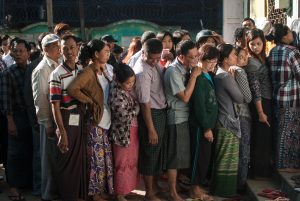While reporting on the Myanmar’s last election in 2015, I took a photograph of voters lining up at a polling station at a Buddhist monastery in the central city of Mandalay. Eager to vote in the country’s first free national poll in more than half a century, they crowded together in tight ranks – the men in longyis and shirts, the women sporting long skirts and swirls of thanaka on their cheeks – as the first streaks of morning light filtered through the trees. At the time, it struck me as a hopeful scene of political participation after decades of repressive military rule. Seen today, in the age of the coronavirus, the cheerful jostling and crowding also illustrates the challenges of holding a national election in the midst of a viral pandemic.
Today, Myanmar begins campaigning for its national election on November 8, when more than 1,100 seats will be up for grabs in the Pyithu Hluttaw (Lower House), Amyotha Hluttaw (Upper House) and across state and regional parliaments.
The campaign begins under the darkening cloud of COVID-19. On September 7, Aung San Suu Kyi, Myanmar’s de facto leader and chairperson of the ruling National League for Democracy (NLD), announced that she was canceling her inaugural campaign appearance today, citing a recent uptick in COVID-19 cases. Suu Kyi was scheduled to tour the constituency of Kawhmu, on the outskirts of the commercial capital Yangon, where she is seeking re-election to the Pyithu Hluttaw.
Despite being burdened with active civil conflicts and one of the world’s weakest health systems, Myanmar has so far been spared the sort of runaway COVID-19 outbreaks that have hit India, Pakistan, Indonesia, and the Philippines. But recent weeks have seen a worrying spike in coronavirus cases. In mid-August, after weeks without a local coronavirus transmission, Myanmar authorities reported an outbreak in Rakhine State on the country’s west coast. Since then, the nationwide COVID-19 tally has more than doubled to 1,464 infections and eight deaths, leading to partial lockdowns in key townships of Yangon.
On September 6, the country reported 100 new coronavirus cases, the biggest daily increase since the first confirmed infection in March, including one on the grounds of Aung San Suu Kyi’s lakeside residence in Yangon. This was followed by 45 more infections on September 7.
The increasing spread of COVID-19 is set to have unpredictable effects on the conduct and outcome of the election. As Nicholas Ross argued in a detailed recent rundown in New Mandala, uncertainty over how Myanmar’s Union Election Commission (UEC) plans to regulate campaigning and voting on account of the pandemic has hampered the ability of parties and civil society organizations to prepare effectively for the polls, leading some to call for a postponement. The UEC only issued its COVID-19 Standard Operating Protocols on September 7, less than 24 hours after the beginning of the campaign. (The protocols are currently only available in Burmese, but will likely involve social distancing and mandatory face masks at polling stations, in addition to limits on mass public gatherings).
However strict they turn out to be, the restrictions will almost certainly rule out conventional election campaigning, with complex implications for the outcome in some seats. As Ross noted, any restriction on gatherings will “likely benefit major parties like the NLD and [military-backed Union Solidarity and Development Party], which have local offices throughout Myanmar and can better engage in door-to-door canvassing.” As the party with one of the largest followings on Facebook, the NLD is also likely to be advantaged by the turn to online campaigning, to the detriment of smaller parties.
While COVID-19 is unlikely to alter the overall election result – anchored by Aung San Suu Kyi’s talismanic public image, the NLD will almost certainly sweep the ethnic Burman heartland on the way to a second term in office – it could have impact in races along the country’s ethnically diverse periphery. All things being equal, many have predicted that the NLD will struggle to win over voters in the ethnic minority states, who voted in droves for Aung San Suu Kyi in 2015, but have grown skeptical about the NLD’s ability to represent and advance ethnic minority concerns.
At the same time, in many of these regions internet access remains sporadic, and has even been purposefully blacked out in parts of Rakhine and Chin states due to the ongoing fighting between the insurgent Arakan Army and the Myanmar military. One possible impact is that public health restrictions could throw up unexpected results in certain seats. In these cases, Ross notes, the difficulties of international observers entering the country to monitor the election could cast doubts on the legitimacy of the poll.
In reality, much depends on how Myanmar handles the spread of COVID-19 in the weeks to come. But it seems likely that due to the combined impact of tight public health restrictions, ongoing conflict and disenfranchisement, scant international election monitoring, and a host of other technical problems, the election will produce a distorted reflection of the popular will. History could well end up recording Myanmar’s 2020 election – its second since the country’s transition from open military rule – with an asterisk affixed.

































